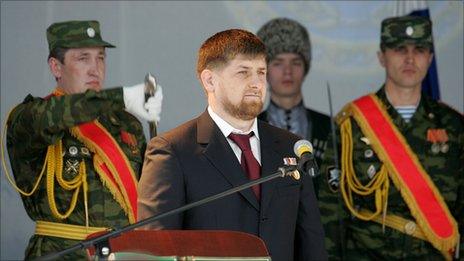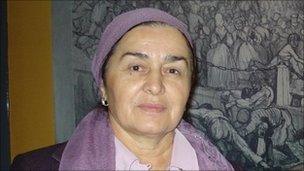Can Chechen President Kadyrov stamp out bride-stealing?
- Published

Critics doubt whether the president has the will to tackle the traditional practice
The authorities in Russia's southern republic of Chechnya say they are taking unprecedented steps to stop women from being kidnapped and forced into marriage.
Lucy Ash, who recently made a film for the BBC about the centuries-old practice of bride-stealing, asks how effective these new measures will be.
Surfing the web two years ago, I stumbled across some shocking footage. The pictures, shot on mobile phones, showed young Chechen women being snatched off the street by burly men in leather jackets and pushed into cars.
At first these films, set to romantic pop music, looked almost comic. But then I heard the natural soundtrack - screaming and gunfire.
Those grainy images were my introduction to the extraordinary practice of bride-stealing.
'Un-Islamic'
I decided to travel to Chechnya to try and understand why so many weddings there begin with abduction. I also wanted to investigate the role local mullahs play in brokering a deal between families after a girl is kidnapped.
While I was there, Zulikhan, a 22-year-old student, was grabbed off the street on her way home from college by a man she barely knew. A week later, wearing a high-necked wedding dress and a mournful expression, she was married to Bogdan, her kidnapper.
I was present during most of the tense negotiations between her grandfather and representatives from the groom's family.
It became increasingly clear that Zulikhan would have no say in the matter. Her future was decided by a roomful of elderly men and a young mullah who, it later emerged, had stolen his own wife.
When I first asked the Chechen authorities why such practices were tolerated, the president's press spokesman assured me that bride-stealing was a thing of the past.
Now the authorities have announced that imams who facilitate weddings involving kidnapped women risk punishment and possible excommunication.
Last week, after a meeting with Chechnya's religious leader, Mufti Sultan Mirzayev, President Ramzan Kadyrov declared that abducting brides was un-Islamic and must be "eradicated from society".
Deterrent
The following day, at a meeting of 300 religious judges and imams from mosques across the republic, Mr Mirzayev warned that kidnappings often provoked blood feuds and ended in tragedy.
Last year four people, including a stolen bride, died in a car chase when her kidnapper tried to avoid pursuit by the woman's family.
Mr Mirzayev said in the future kidnappers would be hit in the pocket with a 1m-rouble (£21,000) fine, payable to the girl's family.
The financial penalty is not new, although it has been drastically increased from 30,000 roubles (£633), but some doubt it will prove a real deterrent.
"Of course it's a lot of money, but for a well-off guy, it's not a big deal - it won't put him off if he really wants the girl," one Chechen businessman told me. "As for those without money, well… they'll just have to look and not touch," he laughed.
"Perhaps the president is right," he added, "but we are mountain people, proud of our traditions, and this custom has been going on for centuries - you can't get rid of it overnight".
Lipkhan Bazaeva, head of the Women's Dignity Centre in Grozny, believes bride-stealing has increased significantly in recent years after two devastating pro-independence wars against Russia brutalised Chechen society.
Her group conducted a survey which found that as many as one in five brides had been stolen.
Contradictory forces
Mrs Bazaeva and her colleagues often visit schools to educate teenagers about the dangers of bride-stealing, and she has also discussed the issue on local television.

Lipkhan Bazaeva fears the new measures do not go far enough to prevent the practice
"This new fine is a positive step and we hope it will help to get rid of this shameful tradition, but I fear some highly-placed people will carry on regardless.
"It is not just because they have money - there are always other factors.
"I worry that people who have arms, who have links to the power structures, will still be able to act with impunity."
Instead of increasing the fine, Mrs Bazaeva would prefer the authorities to enact existing Russian laws which punish kidnapping with up to nine years in prison.
It is not yet clear to what extent President Kadyrov expects law enforcement bodies to get involved. People here struggle to balance the often contradictory forces of Russian law, Islamic Sharia law and Chechen tradition.
When a woman is stolen here, families rarely contact the police - instead, they go to their village imam.
Anyone who believes that the official clampdown on bride-stealing means a brighter future for women's civil and social rights here might be sorely disappointed.
Since June, unidentified men with paintball guns have driven round the centre of Grozny shooting at women with uncovered heads. Leaflets were pinned on doors and scattered on the pavements which urged women to dress more modestly or face the consequences:
"Today we have sprayed you with paint, but this is only a warning!!! Don't compel us to have recourse to more persuasive measures!"
On state television, Mr Kadyrov said he did not know who was responsible for the attacks, but added: "When I find them, I will express my gratitude."
- Published10 August 2010
- Published9 July 2010